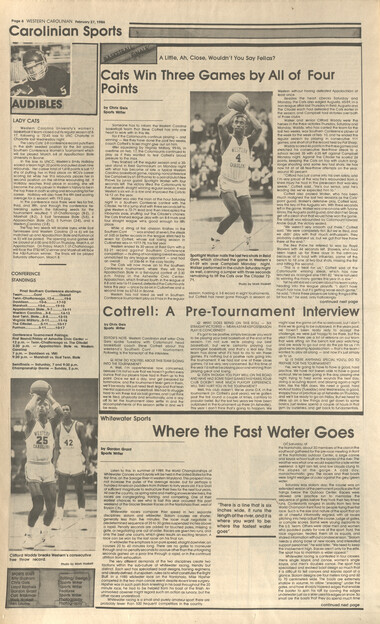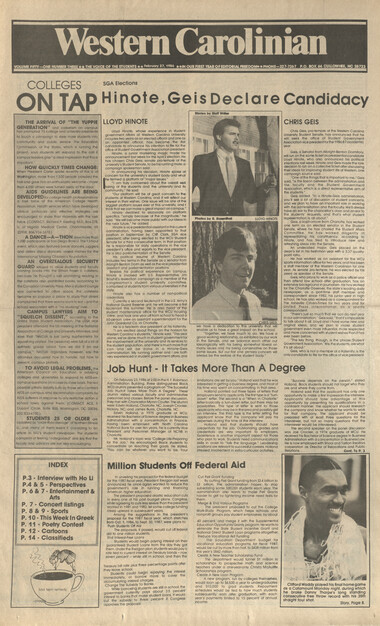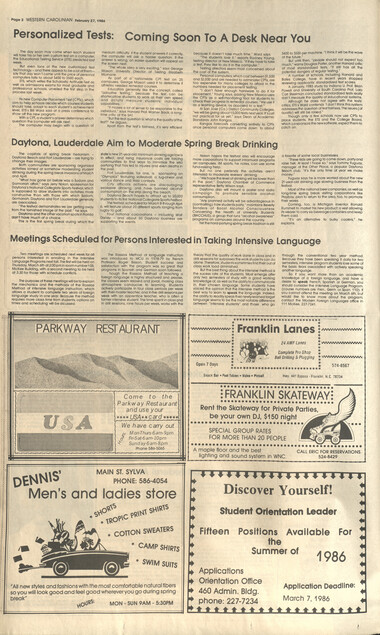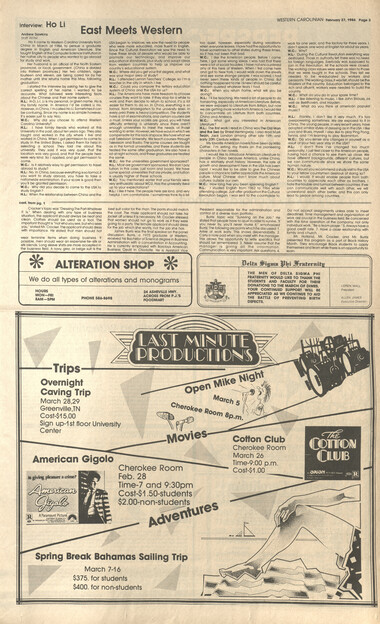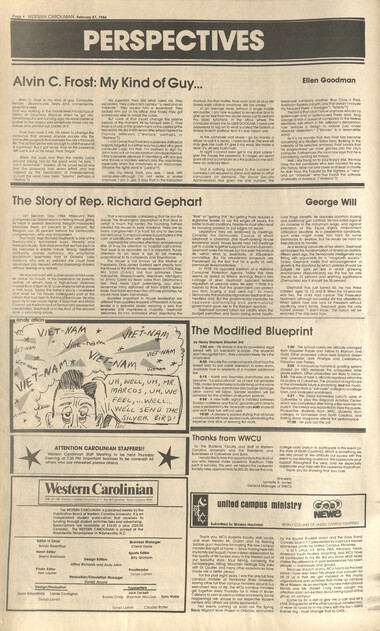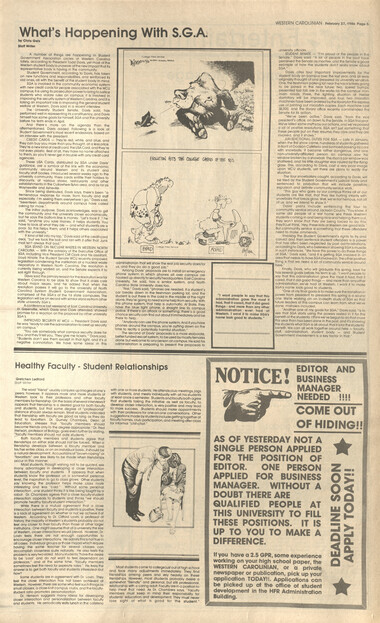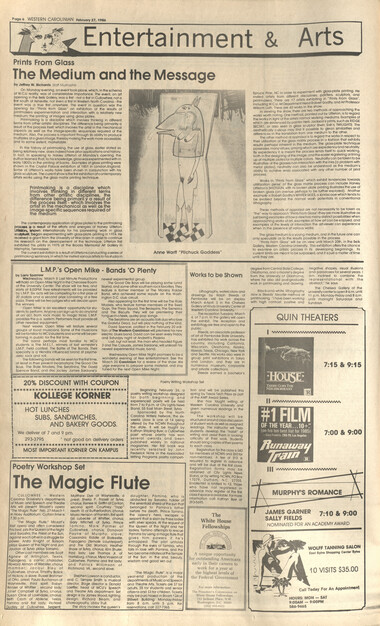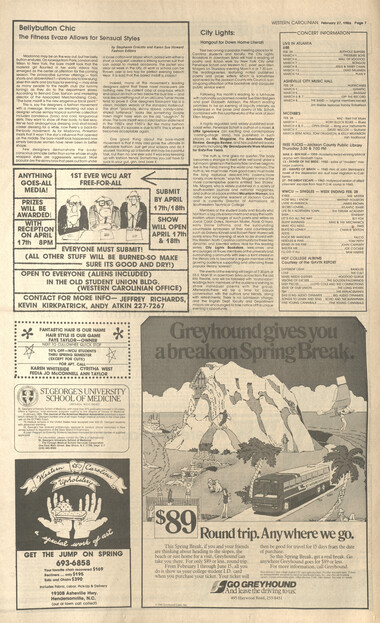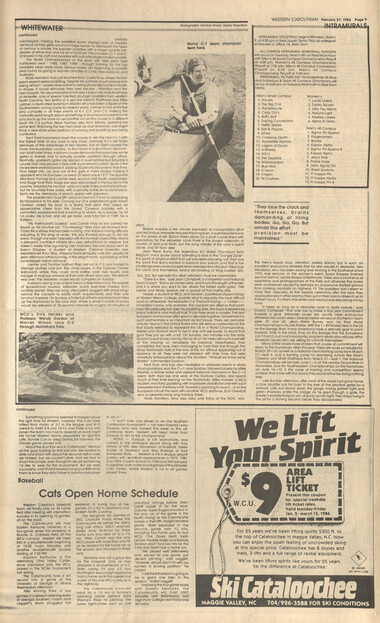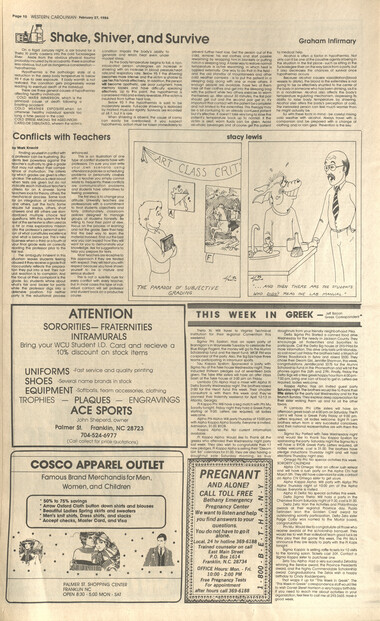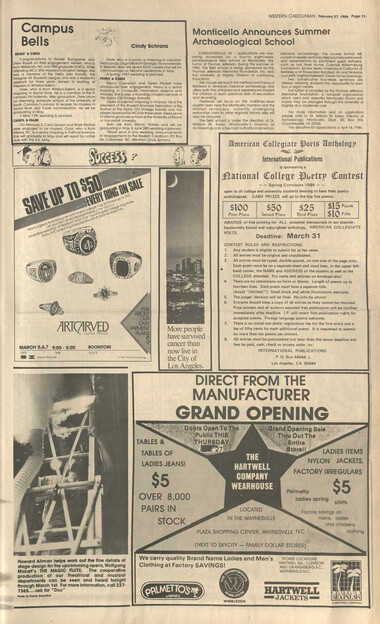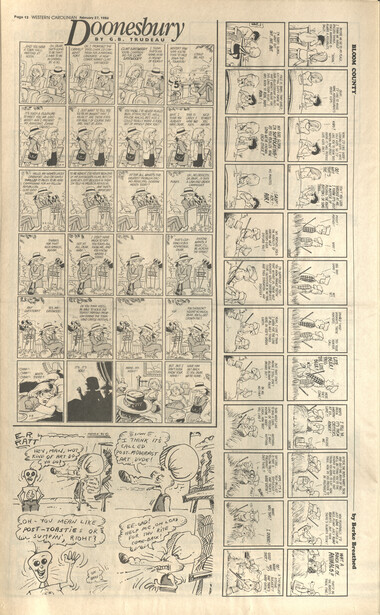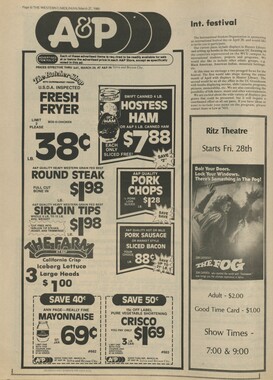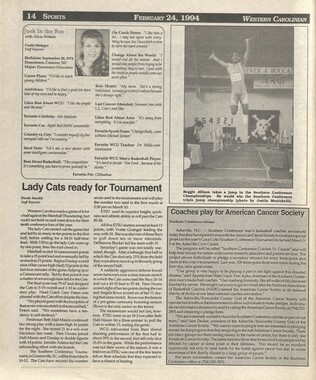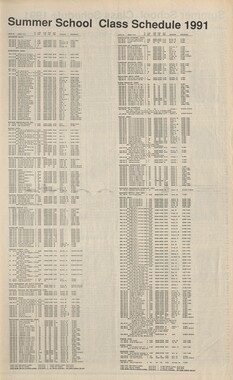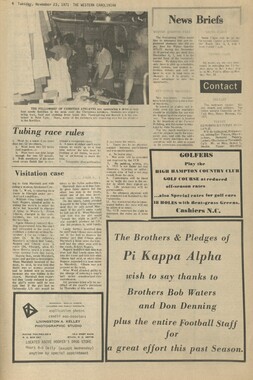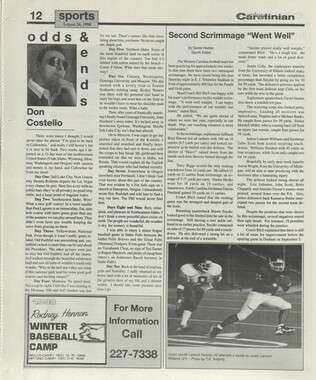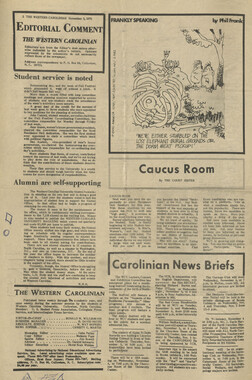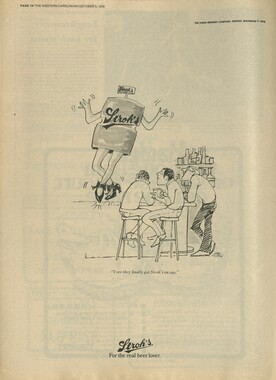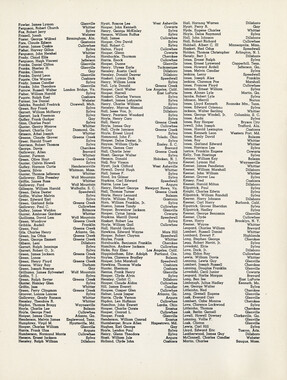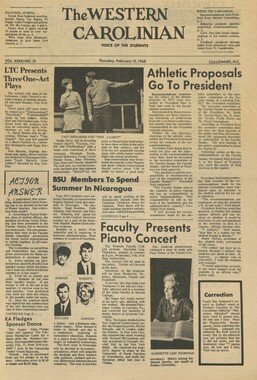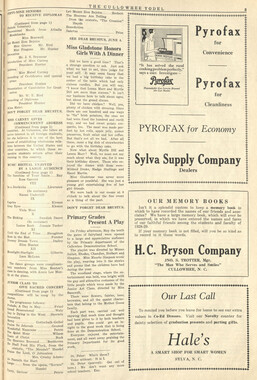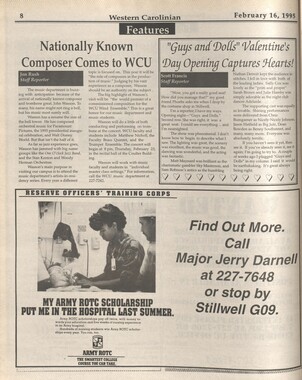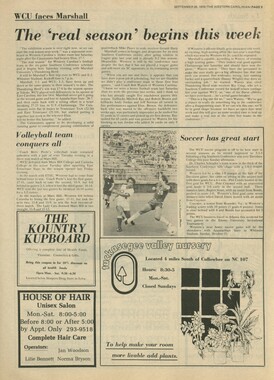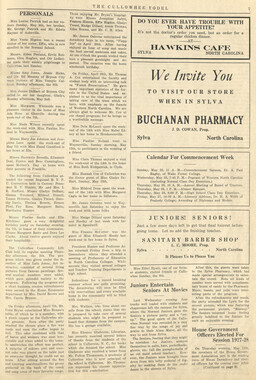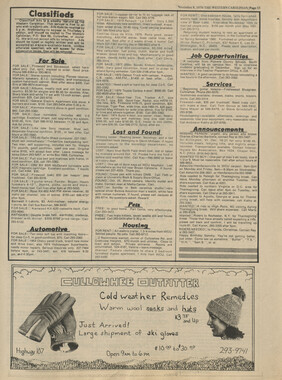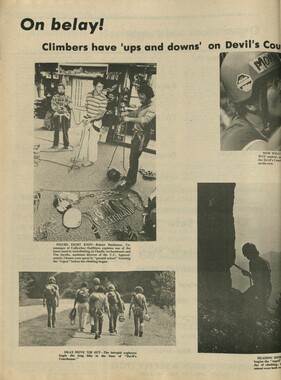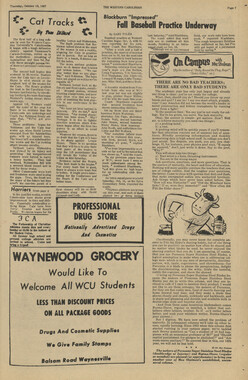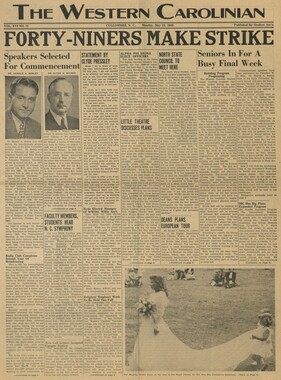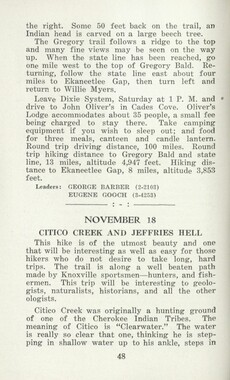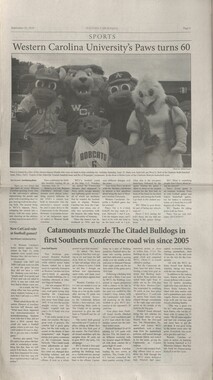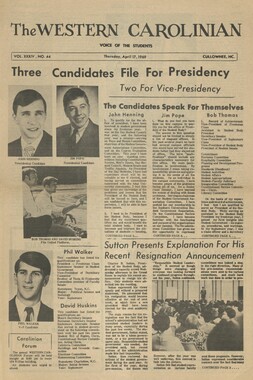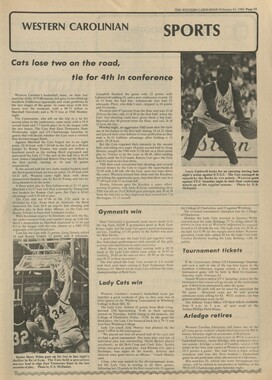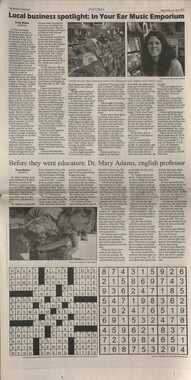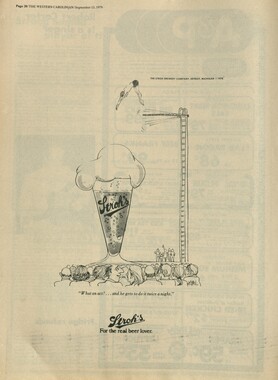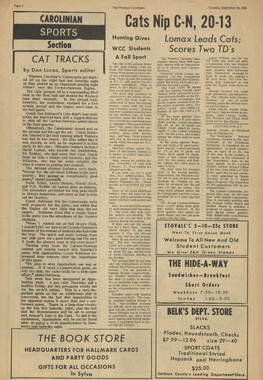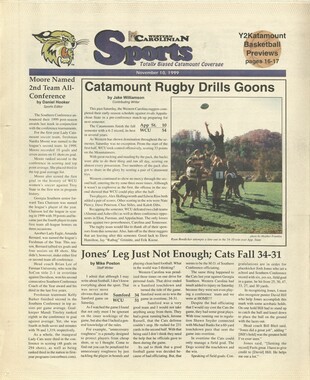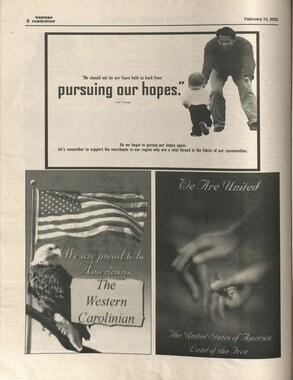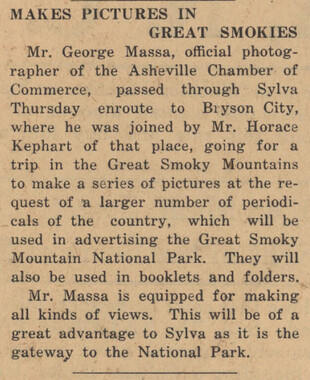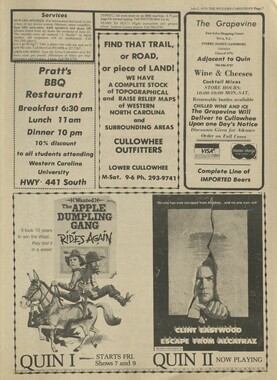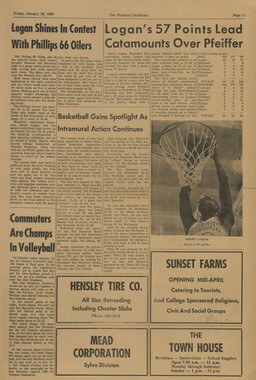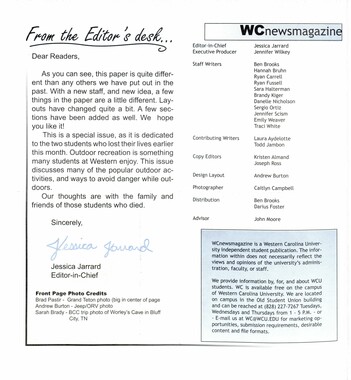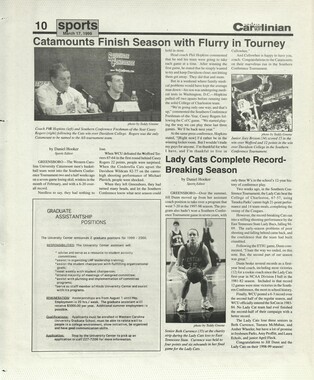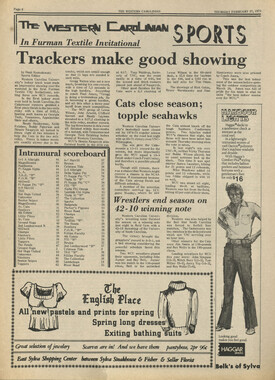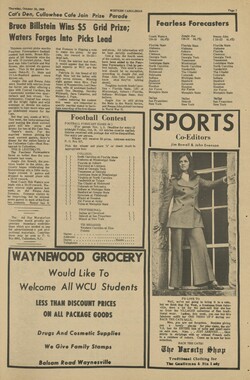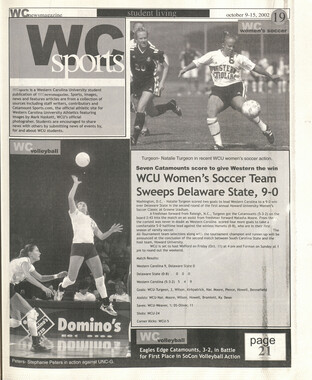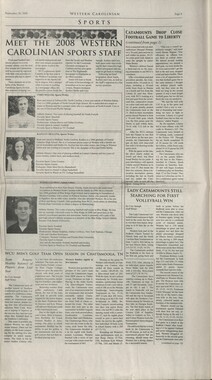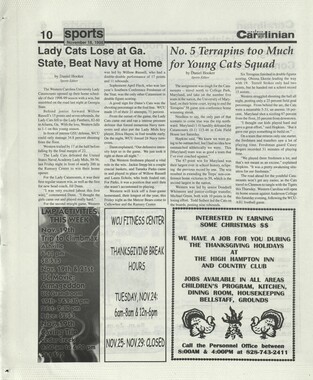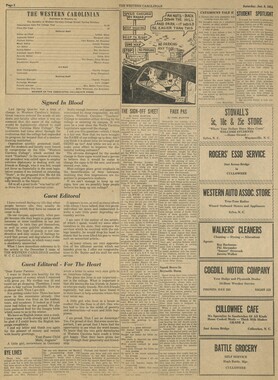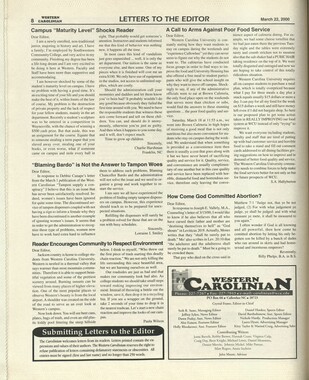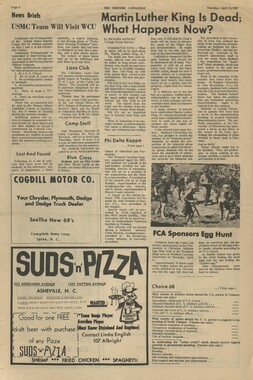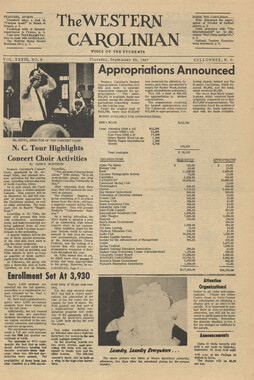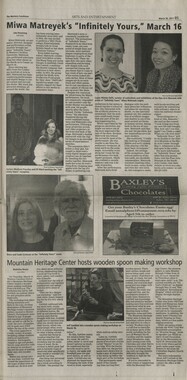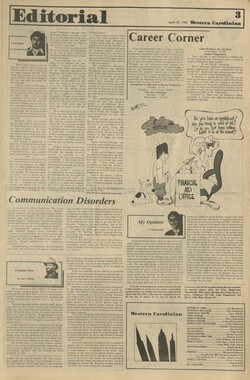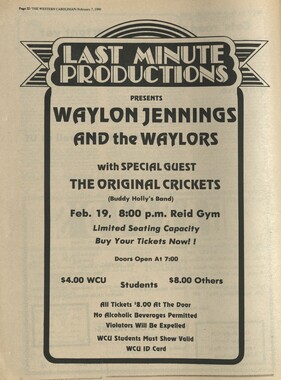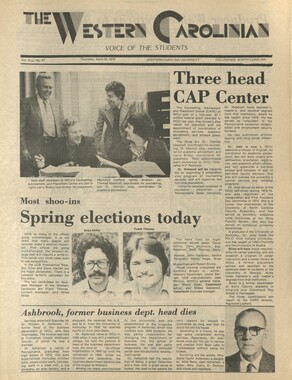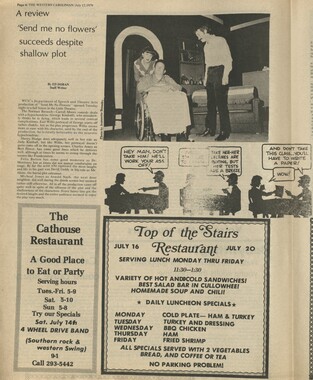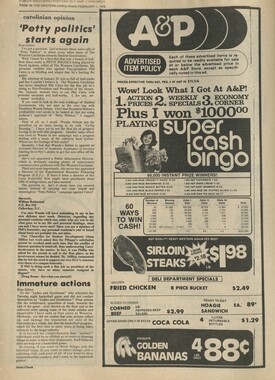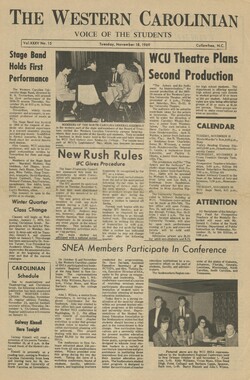Western Carolina University (21)
View all
- Canton Champion Fibre Company (2308)
- Cherokee Traditions (291)
- Civil War in Southern Appalachia (165)
- Craft Revival (1942)
- George Masa Collection (137)
- Great Smoky Mountains - A Park for America (3080)
- Highlights from Western Carolina University (422)
- Horace Kephart (973)
- Journeys Through Jackson (159)
- LGBTQIA+ Archive of Jackson County (89)
- Oral Histories of Western North Carolina (318)
- Picturing Appalachia (6617)
- Stories of Mountain Folk (413)
- Travel Western North Carolina (153)
- Western Carolina University Fine Art Museum Vitreograph Collection (129)
- Western Carolina University Herbarium (92)
- Western Carolina University: Making Memories (738)
- Western Carolina University Publications (2491)
- Western Carolina University Restricted Electronic Theses and Dissertations (146)
- Western North Carolina Regional Maps (71)
- World War II in Southern Appalachia (131)
University of North Carolina Asheville (6)
View all
- Allanstand Cottage Industries (62)
- Appalachian National Park Association (53)
- Bennett, Kelly, 1890-1974 (1463)
- Berry, Walter (76)
- Brasstown Carvers (40)
- Carver, George Washington, 1864?-1943 (26)
- Cathey, Joseph, 1803-1874 (1)
- Champion Fibre Company (233)
- Champion Paper and Fibre Company (297)
- Cherokee Indian Fair Association (16)
- Cherokee Language Program (22)
- Crowe, Amanda (40)
- Edmonston, Thomas Benton, 1842-1907 (7)
- Ensley, A. L. (Abraham Lincoln), 1865-1948 (275)
- Fromer, Irving Rhodes, 1913-1994 (70)
- George Butz (BFS 1907) (46)
- Goodrich, Frances Louisa (120)
- Grant, George Alexander, 1891-1964 (96)
- Heard, Marian Gladys (60)
- Kephart, Calvin, 1883-1969 (15)
- Kephart, Horace, 1862-1931 (313)
- Kephart, Laura, 1862-1954 (67)
- Laney, Gideon Thomas, 1889-1976 (439)
- Masa, George, 1881-1933 (61)
- McElhinney, William Julian, 1896-1953 (44)
- Niggli, Josephina, 1910-1983 (10)
- North Carolina Park Commission (105)
- Osborne, Kezia Stradley (9)
- Owens, Samuel Robert, 1918-1995 (11)
- Penland Weavers and Potters (36)
- Roberts, Vivienne (15)
- Roth, Albert, 1890-1974 (142)
- Schenck, Carl Alwin, 1868-1955 (1)
- Sherrill's Photography Studio (2565)
- Southern Highland Handicraft Guild (127)
- Southern Highlanders, Inc. (71)
- Stalcup, Jesse Bryson (46)
- Stearns, I. K. (213)
- Thompson, James Edward, 1880-1976 (226)
- United States. Indian Arts and Crafts Board (130)
- USFS (683)
- Vance, Zebulon Baird, 1830-1894 (1)
- Weaver, Zebulon, 1872-1948 (58)
- Western Carolina College (230)
- Western Carolina Teachers College (282)
- Western Carolina University (2008)
- Western Carolina University. Mountain Heritage Center (18)
- Whitman, Walt, 1819-1892 (10)
- Wilburn, Hiram Coleman, 1880-1967 (73)
- Williams, Isadora (3)
- Cain, Doreyl Ammons (0)
- Crittenden, Lorraine (0)
- Rhodes, Judy (0)
- Smith, Edward Clark (0)
- Appalachian Region, Southern (3032)
- Asheville (N.C.) (1945)
- Avery County (N.C.) (26)
- Blount County (Tenn.) (195)
- Buncombe County (N.C.) (1680)
- Cherokee County (N.C.) (283)
- Clay County (N.C.) (556)
- Graham County (N.C.) (238)
- Great Smoky Mountains National Park (N.C. and Tenn.) (525)
- Haywood County (N.C.) (3573)
- Henderson County (N.C.) (70)
- Jackson County (N.C.) (4925)
- Knox County (Tenn.) (35)
- Knoxville (Tenn.) (13)
- Lake Santeetlah (N.C.) (10)
- Macon County (N.C.) (421)
- Madison County (N.C.) (216)
- McDowell County (N.C.) (39)
- Mitchell County (N.C.) (135)
- Polk County (N.C.) (35)
- Qualla Boundary (982)
- Rutherford County (N.C.) (78)
- Swain County (N.C.) (2185)
- Transylvania County (N.C.) (270)
- Watauga County (N.C.) (12)
- Waynesville (N.C.) (86)
- Yancey County (N.C.) (72)
- Aerial Photographs (3)
- Aerial Views (60)
- Albums (books) (4)
- Articles (1)
- Artifacts (object Genre) (228)
- Bibliographies (1)
- Biography (general Genre) (2)
- Cards (information Artifacts) (38)
- Clippings (information Artifacts) (192)
- Copybooks (instructional Materials) (3)
- Crafts (art Genres) (622)
- Depictions (visual Works) (21)
- Design Drawings (1)
- Digital Moving Image Formats (2)
- Drawings (visual Works) (185)
- Envelopes (101)
- Exhibitions (events) (1)
- Facsimiles (reproductions) (1)
- Fiction (general Genre) (4)
- Financial Records (12)
- Fliers (printed Matter) (67)
- Glass Plate Negatives (381)
- Guidebooks (2)
- Internegatives (10)
- Interviews (823)
- Land Surveys (102)
- Letters (correspondence) (1045)
- Manuscripts (documents) (618)
- Maps (documents) (177)
- Memorandums (25)
- Minutes (administrative Records) (59)
- Negatives (photographs) (6090)
- Newsletters (1290)
- Newspapers (2)
- Notebooks (8)
- Occupation Currency (1)
- Paintings (visual Works) (1)
- Pen And Ink Drawings (1)
- Periodicals (194)
- Personal Narratives (10)
- Photographs (12977)
- Plans (maps) (1)
- Poetry (6)
- Portraits (4568)
- Postcards (329)
- Programs (documents) (181)
- Publications (documents) (2444)
- Questionnaires (65)
- Relief Prints (26)
- Sayings (literary Genre) (1)
- Scrapbooks (282)
- Sheet Music (2)
- Slides (photographs) (402)
- Songs (musical Compositions) (2)
- Sound Recordings (802)
- Specimens (92)
- Speeches (documents) (18)
- Tintypes (photographs) (8)
- Transcripts (329)
- Text Messages (0)
- A.L. Ensley Collection (275)
- Appalachian Industrial School Records (7)
- Appalachian National Park Association Records (336)
- Axley-Meroney Collection (2)
- Bayard Wootten Photograph Collection (20)
- Bethel Rural Community Organization Collection (7)
- Blumer Collection (5)
- C.W. Slagle Collection (20)
- Canton Area Historical Museum (2110)
- Carlos C. Campbell Collection (462)
- Cataloochee History Project (64)
- Cherokee Studies Collection (4)
- Daisy Dame Photograph Album (5)
- Daniel Boone VI Collection (1)
- Doris Ulmann Photograph Collection (112)
- Elizabeth H. Lasley Collection (1)
- Elizabeth Woolworth Szold Fleharty Collection (4)
- Frank Fry Collection (95)
- George Masa Collection (173)
- Gideon Laney Collection (452)
- Hazel Scarborough Collection (2)
- Hiram C. Wilburn Papers (28)
- Historic Photographs Collection (236)
- Horace Kephart Collection (861)
- Humbard Collection (33)
- Hunter and Weaver Families Collection (1)
- I. D. Blumenthal Collection (4)
- Isadora Williams Collection (4)
- Jesse Bryson Stalcup Collection (47)
- Jim Thompson Collection (224)
- John B. Battle Collection (7)
- John C. Campbell Folk School Records (80)
- John Parris Collection (6)
- Judaculla Rock project (2)
- Kelly Bennett Collection (1482)
- Love Family Papers (11)
- Major Wiley Parris Civil War Letters (3)
- Map Collection (12)
- McFee-Misemer Civil War Letters (34)
- Mountain Heritage Center Collection (4)
- Norburn - Robertson - Thomson Families Collection (44)
- Pauline Hood Collection (7)
- Pre-Guild Collection (2)
- Qualla Arts and Crafts Mutual Collection (12)
- R.A. Romanes Collection (681)
- Rosser H. Taylor Collection (1)
- Samuel Robert Owens Collection (94)
- Sara Madison Collection (144)
- Sherrill Studio Photo Collection (2558)
- Smoky Mountains Hiking Club Collection (616)
- Stories of Mountain Folk - Radio Programs (374)
- The Reporter, Western Carolina University (510)
- Venoy and Elizabeth Reed Collection (16)
- WCU Gender and Sexuality Oral History Project (36)
- WCU Mountain Heritage Center Oral Histories (25)
- WCU Oral History Collection - Mountain People, Mountain Lives (71)
- WCU Students Newspapers Collection (1923)
- Western North Carolina Tomorrow Black Oral History Project (69)
- William Williams Stringfield Collection (2)
- Zebulon Weaver Collection (109)
- African Americans (390)
- Appalachian Trail (35)
- Artisans (521)
- Cherokee art (84)
- Cherokee artists -- North Carolina (10)
- Cherokee language (21)
- Cherokee pottery (101)
- Cherokee women (208)
- Church buildings (190)
- Civilian Conservation Corps (U.S.) (111)
- College student newspapers and periodicals (2012)
- Dams (108)
- Dance (1023)
- Education (222)
- Floods (63)
- Folk music (1015)
- Forced removal, 1813-1903 (2)
- Forest conservation (220)
- Forests and forestry (1198)
- Gender nonconformity (4)
- Great Smoky Mountains National Park (N.C. and Tenn.) (181)
- Hunting (47)
- Landscape photography (25)
- Logging (122)
- Maps (83)
- Mines and mineral resources (9)
- North Carolina -- Maps (18)
- Paper industry (38)
- Postcards (255)
- Pottery (135)
- Railroad trains (72)
- Rural electrification -- North Carolina, Western (3)
- School integration -- Southern States (2)
- Segregation -- North Carolina, Western (5)
- Slavery (5)
- Sports (452)
- Storytelling (243)
- Waterfalls -- Great Smoky Mountains (N.C. and Tenn.) (66)
- Weaving -- Appalachian Region, Southern (280)
- Wood-carving -- Appalachian Region, Southern (328)
- World War, 1939-1945 (173)
Western Carolinian Volume 51 Number 03 (06)
Item
Item’s are ‘child’ level descriptions to ‘parent’ objects, (e.g. one page of a whole book).
-
-
PageS WESTERN CAROLINIAN February 27,1986 Carolinian Sports 1 ■■■ '.■ '"•>•> •■'■mm>™~!m**mm' - ■■•■•■•■•■•■ mmmr^mm. 11 i i.n .1.1.1,1,1, ij, ,1,11.1.1.1.1.1 111. wii.i.1.1,1.1,1.1 1.1 iii.aawaaaf^ay^a^a^p^jajjp^ :. ... UDIBLES LADY CATS Western Carolina University's women's basketball II team closed out its regular season at 8- 17, following a 72-45 loss to UNC Charlotte in Charlotte last Wednesday night. The Lady Cats' 2-8 conference record puts them in the sixth seeded position tor the 3rd annual Southern Conference Women's Tournament which will be played March 6-8 at Appalachian State University in Boone. In the loss to UNCC, Western's Emily Holliday scored a team high 20 points and pulled down nine rebounds. Her career total of 1,418 points is just 17 ; shy of putting her in third place on WCU's career scoring list while her 916 rebounds places her in second position on the all-time rebounding list. If Holliday reaches third place in scoring, she will become the only player in Western's history to be in the top three in both scoring and rebounding for her . career. Holliday will also have the fifth best scoring average for a season with 19.0 ppg. In the conference race there were ties for first, third, and fifth, and Ihrough the conference tie- breaking system the following seeds for the tournament resulted: 1 UT-Chattanooga (8-2), 2 Marshall (8-2), 3 East Tennessee State (5-5), 4 Appalachian State (5-5), 5 Furman (2-8), and 6 Western,Carolina (2-8). The top two seeds will receive byes, while East Tennessee and Western Carolina (3 vs 6) will be matched up and Appalachian State and Furman (4 vs 5) will be paired. The opening round games will be played at 6:00 and 8:00 on Thursday, March 6, at Appalachian. On Friday, March 7, UT-Chattanooga. will face the ETSU-WCU winner and Marshall will face the ASU-Furman winner. The finals will be played Saturday afternoon, March 8. ■■■ A Little, Ah, Close, Wouldn't You Say Fellas? CONFERENCE STANDINGS Final Southern Conference standings: Team Conf Overall Tenn.-Chattanooga..12-4 19-8 Davidson 10-6 17-10 Marshall 10-6 19-10 Appalachian State...9-7 16-11 Western Carolina....8-8 14-13 East Tenn. State....8-8 12-15 Virginia Military...5-11.... 11-16 The Citadel 5-11 10-17 Furman 5-11 10-17 Conference Tournament Pairings: First Round/Friday at Asheville Civic Center — 12 p.m. — Tenn.-Chcrjtanooga vs. The Citadel 2:30 p.m. — Appalachian State vs. Western Carolina 7 p.m. — Davidson vs. VMI 9:30 p.m. — Marshall vs. East Tenn. State Semifinals — Saturday, 7 and 9:30 p.m. Championship Game — Sunday, 2 p.m. i - V Clifford Waddy breaks Western's consecutive free throw record. Photo by Mark Haskett Cats Win Three Games by All of Four Points by Chris Geis Sports Writer Someone has to inform the Western Carolina basketbpll team that Steve Cottrell has only one heart to work with in this life. For if the Catamounts continue playing — and winning — like they have done the past two weeks, coach Cottrell's ticker might give out on him. After squeaking by Virginia Military, 99-96, in overtime on Feb. 17, the Catamounts continued to play as if they wanted to test Cottrell's blood pressure to the max. They finished off the regular season and a 30- year stand in Reid Gymnasium on Monday night with what has become of late a typical Western Carolina basketball game, nipping nonconference foe Campbell by 61-59 thanks to a pair of clutch free throws by junior guard Spotlight Walker with four seconds left. The victory lifted the Catamounts to their seventh straight winning regular season. It was Western's six win in a row and improved the Cats to 14-13 on the year. Walker was also the man of the hour Saturday night in a Southern Conferene contest with The Citadel. He hit a jump shot with three seconds left to give Western a 72-71 lead and then intercepted the inbounds pass, snuffing out The Citadel's chanes. The Cats finished league play with an 8-8 mark and four straight league wins, good enough for fifth place. While a string of first -division finishes in the Southern Conf - was ended at seven, the streak of .500 or better records in the league stretched to seven for Cottrell, whose last losing season in Cullowhee was in 1977-78, his first year. Western ended its 30 years at Reid Gym with a 52-21 record against Southern Conference competition — its string of non-losing overa II records unmatched by any league opponent — and had an overall of 336-84 in the cozy facility. The Cats will now move on to the Southern Conference tournament, where they will face Appalachian State in a first-round contest at 2:30 p.m. Friday in the Asheville Civic Center. Appalachian, which finished fourth in the league at 8-8and was16-11 overa II, defeated the Cata mounts twice this year — once by 66-64 in Cullowhee and a second time by 67-53 in Boone. Western has not fared as well in Southern Conference tournament play as it has in the regular ' Spotlight Walker nails the last two shots In Reid Gym, which clinched the game in Western's 61-59 win over Campbell Monday night. Walker performed in the clutch Saturday night as well, canning a jumper with three seconds remaining to lift the Cats over The Citadel 72- 71. Photo by Mark Haskett season, holding a 3-8 record in eight tournaments, but Cottrell has never gone through a season at Western without having defeated Appalachian at least once. Besides the heart checks Saturday and Monday, the Cats also edged Augusta, 60-59, in a non-league affair last Thursday in Reid. Augusta and The Citadel each had defeated the Cats earlier in the season, and Campbell had victories over both of those clubs. Walker and senior Clifford Waddy were Ihe heroes in the three victories Thursday, Saturday and Monday. Waddy, who has carried the team for the last two weeks, was Southern Conference player of the week for the week of Feb. 10, and he ended the regular season by playing in consecutive 111 games, one short of of the record held by Pat Sharp. Waddy scored 46 points in the threegamesand stretched his consecutive free-throw streak to a school record 35 with 6:35 left against Campbell Monday night. Against The Citadel he scored 24 points, keeping Ihe Cats on top with clutch long- range shooting and some key foul shots. He has now hit 61 of 68 free-throw attempts on the year, around 90 percent. "Clifford has just come into his own lately, and I'm very proud of the way he's rebounded from a knee injury he had in the preseason that was very severe," Cottrell said. "He's our senior, and he's leading like we've expected him to." Cottrell also praised Walker, who has been much maligned the last two seasons as the Cats' point guard. Walker's defensive play, Cottrell said, was the key of the Augusta win. With three seconds left in the game, Walker was one-on-one with Tyrone Gross, the Augusta pointguard.and didn't let Gross get off a clean shot that would have won the game. The airball was rebounded by Catamount forward Andre Gault, the victory sealed. "We weren't very smooth out there," Cottrell said. "We were completely flat. But we're tired, and we didn' play with that much enthusiasm. They probably outplayed us, but we got that free throw there at the end." The free throw he referred to was by Hoyd Showers with 44 seconds left. Showers, who had been layed up for three days in the infirmary because of a bout wilh influenza, came off the bench to hit one of two foul shots, missing the first and hitting the second. "This is a treat for us," Cottrell said of the Catamounts' winning streak, which has now reached six, its longest sine 1981 -82. "We're not used to winning this many games this year in a row." Yet he still voiced concern about his team's play heading into the league playoffs. "I don't have much hair now, but it's getting worse each game," he said. "I thinkthese players are taking thingsa little bit too far," he said, only half-jokingly. continued next page Cottrell: A Pre-Tournament Interview by Chris Geis Sports Writer EDITOR'S NOTE: Western Carolinian staff writer Chris Geis spoke Tuesday with Catamount head basketball coach Steve Cottrell about this weekend's Southern Conf tournament. Following is the transcript of the interview. Q: HOW DO YOU FEEL ABOUT THIS TEAM GOING INTO THE TOURNAMENT? A: Well, I'm apprehensive now, concerned, beause I'm not so sure that we haven't gottenevery ounce that our players have had in them up to this point. Once we rest a day, and get prepared for tommorow, and the tournament fever gets in them, we'll be ready. We just need fresh legs and that fresh mental approach to basketball. We had to struggle hard to win these fast six ball games, and I just think we're tired, physically and emotionally, and a day off to let the tournament idea settle in and the accomplishments of this season settle in and we'll be ready. <S: WHAT DOES BEING ON THIS ROLL - SIX STRAIGHT VICTORIES - MEAN AS FAR AS POSTSEASON PLAY IS CONCERNED? It's got to be positive, simply because you wa nt to be playing your best basketball at the end of the season. I'm not sure we're playing our best basketball, but we're certainly playing our winningest basketball, and that's a real key. This team has done what it's had to do to win these games. It's nothing but a positive note going into the tournament. If we had lost one of Ihese close games, I'd be very, very concerned. But this time of the year I'd rather be playing poorand winning than playing great and losing. Q: EVEN THOUGH YOU PLAY WELL ON THE ROAD AND HAVE HAD SOME TIGHT GAMES THIS YEARS, YOUR CLUB DOESN'T HAVE MUCH PLAYOFF EXPERIENCE. WILL THAT HURT YOU IN THE TOURNAMENT? Well, this club doesn't. We've done O.K. in the tournament (in Cottrell's past years); we've gotten past the first round a couple of times, contrary to popular belief. But the last two years we have been outplayed in the tournament up there (in Asheville). This year I don't think that's going to happen. We might lose me game on the scoreboard, but I don't think we're going to be outplayed. In the years past, we haven't been really redy to accept the challenge, we were just happy to be there, but this year 1 think there are a lot of veterans on our team that were sitting on the bench last year watching and are ready to go out and do the job for us. I'm glad we're playing Appalachian — that's the team I wanted to play all along — and now it's just simply up to us. Q: IS THERE ANYTHING SPECIAL YOU'LL DO TO PREPARE FOR THIS TOURNAMENT? Yes, we're going to have to have a good, hard practice. We have not bveen able to have a good workout. We've been going in the day, playing one night, trying to heal some wounds the next day, doing a scouting report, and playing again a night later, like the NBA does. We need a good, hard workout today (Tuesday) and Wednesday, a good, snappy hour of practice up at Asheville on Thursday, and we'll be ready to go on Friday. But we need to dress up on a few things and get down to some basics, just review, spend a couple of hours in that gym by ourselves, and get back to fundamentals. Whitewater Sports Where the Fast Water Goes by Gordon Grant Sports Writer Listen to this: in summer of 1989, the World Championships of Whitewater Canoes and Kayaks will be held in the United States for the first time, on the Savage River in western Maryland. This prospect may not increase the pulse of the average reader, but for perhaps a hundred American paddlers from thirteen to forty years old, it isa Grail of sufficient magnitude to restructure their lives for the next four years. All over the country, as spring rains and melting snows renew rivers, the racers are congregating, training, and competing. One of their earliest chances to see who is fast this year occurred this past weekend at the Glacier Breaker Races on the Nantahala River, west of Bryson City. Whitewater racers compare thier speed in two separate disciplines: slalom and wildwater. Slalom courses are shorter, generally less than five minutes. The racer must negotiate a predetermined sequence of 25 to 30 gates suspended inches above a rapid. Penalty seconds are added for touched poles, missing a gate, or negotiating one out of order. Racers are given two runs, and only the best one counts, which gives results an exciting tension. A race can be won by the last racer on his final run. In wildwater the emphasis is on pure speed, straight downriver, on courses 20 to 40 minutes long. There are no gates to maneuver through and no penalty seconds to accrue other than the unforgiving seconds gained on a poor line through a rapid, or in the continual attrition from exhaustion. The very different demands of the two disciplines create two factions within the sub-culture of Whitewater racing, friendly but distinct. Each sect has specialized boat designs, training regimens, and clearly defined - if unspoken - rules as to what constitutes the Right Stuff. In a 1985 wildwater race on the Nantahala, Mike Hipsher competed in the two man canoe event despite recent knee surgery. Hipsher was in such pain from kneeling in his boat throughout the 20 minute race, he had to be helped from his boat a\ the finish. An uninvotved observer might regard such an action as lunacy, but the other racers understood. Whitewater racing is a small and purely amateur sport: there are probably fewer than 500 frequent competitors in the country. "There is a line that is six inches wide, it runs the length of the river, and it is where you want to be: where the fastest water goes" On Saturday, at the Nantahala, about 30 members of the clan in the southeast gathered for the pre-race meeting in front of the Nantahala outdoor Center, a large canoe and kayak school built on the banks of the river. The weather was what one would expectfor a late winter weekend: a light rain fell, and low clouds clung to the slopes of the gorge. A cold day; monochromatic; grey. The racers and their boats were bright wedges of color against the grey/green water. Saturday was slalom day; the course was an extended version of the permanent practice site that hangs below the Outdoor Center. Racers were allowed one practice run to memorize the = sequence of gates before they took their two timed runs. Contestants ranged in ability from two time World Champion Kent Ford to people trying theirfirst race. Such is the size and nature of the sport that an air of cheerful informality reigned, with all racers pitching into help adjust the course, judge at gates, or compile scores. Some were young aspirants to the U.S. Team. Others were older men and women who paddled purely for love of the sport. Ford, the race organizer, treated them all as equals, and 1 shared information withoutcondescension. "Slalom needs a strong base of new racers, and interested support personnel," he said later. "We need to keep the involvement high. Races aren't only for the elite. The sport has to maintain a wider appeal." Whitewater racing is contested in four classes: mens single kayak and canoe, women's single kayak, and men's doubles canoe. The sport has specialized and evolved boat design so much that it is difficult to tell canoes and kayaks apart at a glance. Slalom designs are four meters long and 60 to 70 centimeters wide. The boats are extremely shallow in volume, to allow "sneaking" under the gates, and have sharply tapered edges that enable the boater to spin his raft by carving the edges underwater j ust as a skier uses his edges on snow. So small are the boats that they do spend much time continued next page
Object
Object’s are ‘parent’ level descriptions to ‘children’ items, (e.g. a book with pages).
-
The Western Carolinian is Western Carolina University's student-run newspaper. The paper was published as the Cullowhee Yodel from 1924 to 1931 before changing its name to The Western Carolinian in 1933.
-
